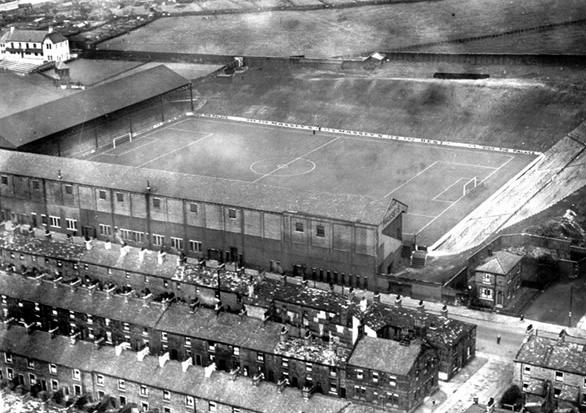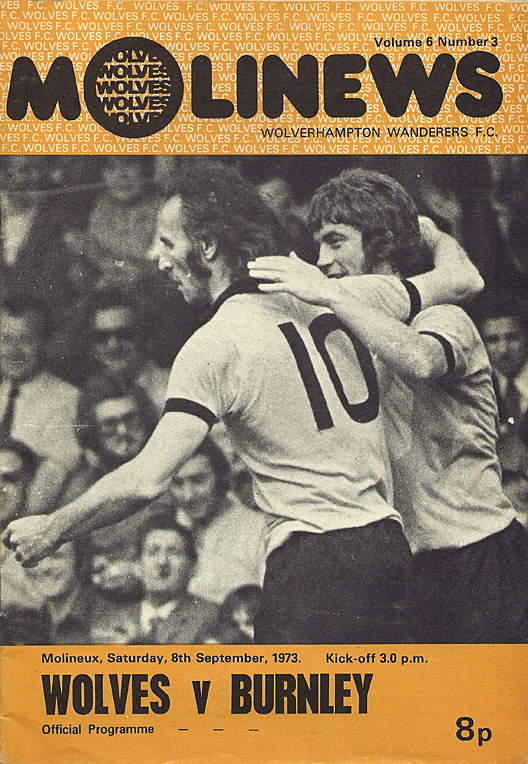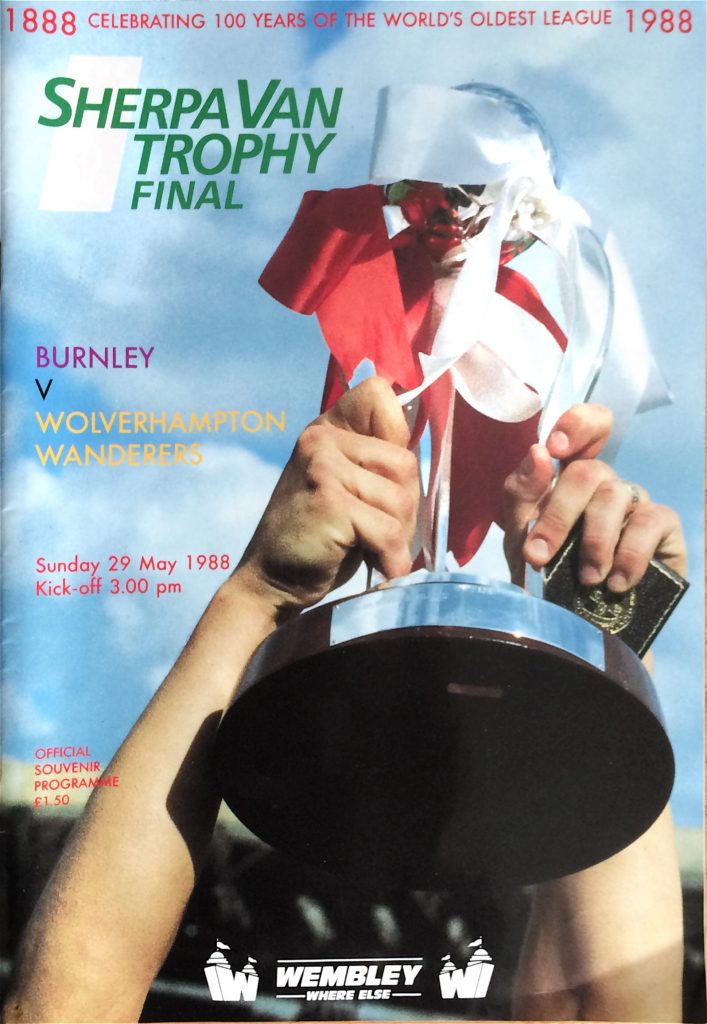Burnley v Wolverhampton Wanderers, 1983
Burnley v Wolverhampton Wanderers was a clash between founder members of the Football League, whose very first meeting was on 22 September 1888. The two sides have just met for the 130th time, in the Premier League, but this match at Burnley’s Turf Moor found them in the Second Division as they fell on hard times in the 1980s. A clip notable for foul weather and the comments of an amused Jimmy Greaves captures these clubs (and English football) at one of the lower points of their long history in April 1983.
Wolves had been relegated from the First Division at the end of the 1981-82 season, and Burnley promoted from the Third. Though Wolves made an immediate return to the top flight at the end of this season, finishing second, Burnley went straight back down. Manager Brian Miller, a member of the 1959-60 League Championship-winning team, was replaced in January 1983 by another ex-player, Frank Casper; although they couldn’t avoid relegation, Burnley achieved notable cup runs. They reached the quarter-finals of the FA Cup and went one better in the Milk (League) Cup, only beaten by eventual winners Liverpool, 3-1 on aggregate over two legs in the semi-final. The highlight of their season was a 4-1 win away at Tottenham in the quarter-final of the competition, on the day Miller was sacked.
In 1982-83, Burnley could still call on the experience of internationals Martin Dobson, Willie Donachie, Brian Flynn, and Billy Hamilton, with the promise of a future England player in Trevor Steven, later a League Champion at Everton, who was signed by Marseille from Rangers in 1991 for a British record transfer of £5.5 million. Alongside Steven, Brian Laws also went on to play in the First Division, as did another product of the Burnley youth system in Mike Phelan, firstly for Norwich and then signed by Manchester United in 1989. Wolves had John Burridge in goal, an ever-present in their promotion season, around halfway through his incredible career of nearly 30 years in the Football League. Geoff Palmer, Kenny Hibbitt and then-club record goalscorer John Richards (returned from a loan spell at Derby that season) had all spent over a decade at Molineux, dating back to their successes of the 70s and early 80s.
Later in the 80s, both clubs dropped into the bottom division for the first time in their illustrious histories; their next meeting after this one was in the Fourth Division in September 1986. Burnley, who had never even been as low as the Third Division before the decade began, only escaped relegation to the Conference on the final day of the 1986-87 season. Meanwhile Wolves, League Cup winners in 1980 (when they finished sixth in the First Division) and FA Cup semi-finalists a year later, suffered three successive relegations between 1984 and 1986. The two met in the Sherpa Van Trophy Final at Wembley in 1988 as they began the gradual climb back to the top of English football, with Wolves the victors.

Turf Moor has hosted continuous League football for Burnley since 1888; only Preston’s Deepdale has seen longer service. Author Mark Metcalf recounts: “On 17 February 1883 Burnley, just nine months old, played their first match opposite the Wellington Hotel, which is still standing today, at Turf Moor against Rawtenstall. As it sounds, it was a piece of turf surrounded by moors, and it didn’t take long for the club’s pioneers to make it splendid enough to accommodate a crowd of 12,000 for the match with local rivals Padiham in March 1884 – 800 being seated in a grandstand, with an uncovered stand along two sides of the field for 5,000 more and the rest being able to watch the football on natural earth banks.
The facilities were good enough for a prince, and in October 1886 Queen Victoria’s son Albert turned up with 9,000 others to take in the action in the local derby match with Bolton. This would appear to be the first time a football ground was visited by a member of the Royal Family.”



Match details for Burnley – Wolverhampton Wanderers; Turf Moor, Football League Division Two, Saturday 2 April 1983:
Burnley: 1 Alan Stevenson, 2 Brian Laws, 3 Willie Donachie, 4 Mike Phelan, 5 Martin Dobson, 6 Brian Flynn, 7 Derek Scott, 8 Trevor Steven, 9 Steve Taylor, 10 Terry Donovan, 11 Kevin Young (sub Vince Overson). Manager: Frank Casper
Wolverhampton Wanderers: 1 John Burridge, 2 John Humphrey, 3 Geoff Palmer, 4 Gordon Smith, 5 John Pender, 6 Alan Dodd, 7 Billy Kellock (sub Kenny Hibbitt), 8 Wayne Clarke, 9 John Richards, 10 Mel Eves, 11 Mike Matthews. Manager: Graham Hawkins. Scorer: Palmer
Attendance: 9, 643

Wolves played their very first Football League season at Dudley Road but moved to Molineux in the summer of 1889, which became the first purpose-built venue for English league football. The club has remained there ever since, playing their first game at the new ground on 7 September 1889. Local entrepreneur Benjamin Molineux acquired the land in 1744 and, over time, the family built a hotel and developed the grounds into a public park, hosting bicycle races, and with sporting facilities including an ice rink and athletics field. The stadium development was on the former pleasure gardens, and retained the name of the Molineux family. Wolves initially rented the site from its owners at the time, the Northampton Brewery Company, and acquired the freehold in 1923. The Molineux Hotel, which later operated as a public house, closed in 1979, but is still standing, and underwent extensive restoration in the early 2000s.
Wolves enjoyed their greatest success in the 1950s; under manager Stan Cullis and led by England captain Billy Wright, they pre-empted the European Cup with a series of floodlit friendlies against Europe’s top sides, and won three league titles during the decade, their last coming in 1958-59. Burnley took the Championship a year later, pipping FA Cup winners Wolves by a point, becoming the town with the smallest population to win the Football League. Both clubs were therefore among the first to compete in the European Cup, as post-War League Champions. In the course of their later decline and eventual rise, these teams became the first to win all four Football League divisions, Wolves completing this feat in 1988, and Burnley four years later. Since 1992, they have been joined by Preston North End, Portsmouth and Sheffield United.


The fluctuating fortunes of league clubs is one of the topics in my book Before the Premier League: A History of the Football League’s Last Decades.